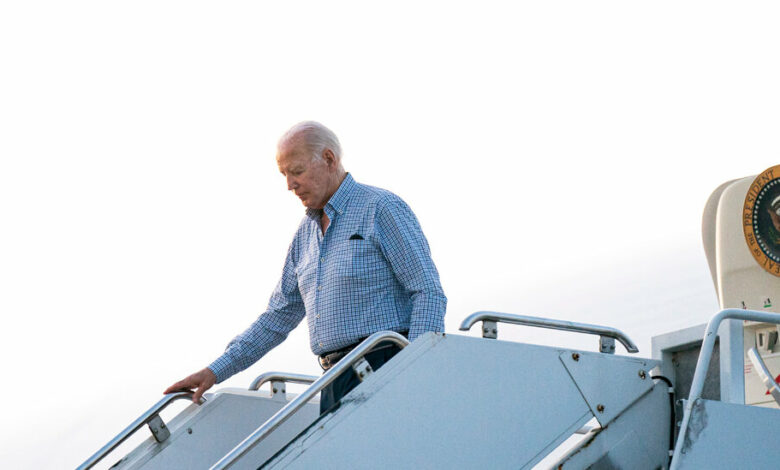CEOs are frustrated. That doesn’t mean they embrace Trump.

When White House Chief of Staff Jeffrey Zients met with dozens of top executives in Washington this month, he came across a familiar list of corporate complaints about President Biden.
Executives of the Business Roundtable, a group representing some of the nation’s largest companies, objected to Mr. Biden’s tax hike proposals. They questioned the lack of corporate representation in the Cabinet. They were angry about what they called overregulation by federal agencies.
While the meeting was not hostile, it was indicative of three and a half years of grumbling by executives about Mr. Biden. Business leaders have criticized his comments about “corporate greed” and his actions on a union picket line. They have chafed at the actions of officials he has appointed — notably the head of the Federal Trade Commission, Lina Khan, who has moved to block a series of corporate mergers.
A number of prominent figures in Silicon Valley and on Wall Street — including the venture capitalists David Sacks and Marc Andreessen, and the hedge fund magnate Kenneth Griffin — have grown increasingly vocal in their criticism of Mr. Biden, their praise for former President Donald J. Trump, or both.
Yet that shift mainly reflects the movement among executives who already supported Republican politicians but had not previously embraced Trump. There is little evidence of a major shift in loyalty among executives away from Mr. Biden and toward Mr. Trump.
Jeffrey Sonnenfeld, a professor at the Yale School of Management who regularly interacts with business leaders, said most CEOs he spoke with favored Biden over Trump, “some of them enthusiastically and some of them biting their lip and holding their nose.”
Executives who have donated to Democrats in the past generally continue to do so: Documents released last week by the Federal Election Commission show donations to Mr. Biden’s campaign committees from business leaders including Marissa Mayer, the former Yahoo chief, and Brad Smith, the Microsoft chief executive — both of whom recently hosted Biden fundraisers — and from Mark Cuban, the technology investor.
And despite subtle signs of waning enthusiasm for Mr. Biden among business elites, neither the White House nor the Biden campaign appear particularly concerned. They see their policies on taxes and regulations as effective and broadly popular. And they cite record corporate profits under Mr. Biden’s presidency.
Still, the administration has taken steps to improve relations with business leaders. In February, a team including Mr. Zients and Treasury Secretary Janet L. Yellen distributed a list of more than 100 top executives to contact, White House officials said. In May, the president met with business leaders, including executives from Marriott, United Airlines and Xerox.
Administration officials say feedback from executives has led to policy changes, such as when the Environmental Protection Agency softened new requirements to reduce emissions from cars and trucks after hearing from automakers.
“We’re not going to agree with companies on everything, but we’re going to talk to them,” Wally Adeyemo, the deputy treasury secretary who regularly speaks to business leaders, said in an interview.
The business world’s frustrations with Mr. Biden partly come down to style and rhetoric. Mr Biden has criticized companies for “ripping people off” by raising prices and reducing product portions, and he has chastised CEOs for lavish pay packages. He has aligned himself with organized labor more often and more explicitly than previous Democratic presidents.
Mr. Biden’s rhetoric has offended even some otherwise sympathetic business leaders. Yale’s Mr. Sonnenfeld called it “needlessly obnoxious” and “self-defeating.” But it may resonate with the public. At pollsAmericans routinely blame big corporations for inflation, and majority in both parties say they generally have a negative view of large companies.
Beyond the atmosphere, a number of Biden administration policies have failed business leaders. Mr. Biden has proposed raising the corporate tax rate from 21 percent to 28 percent (though still below the 35 percent that prevailed until the tax cuts signed by Mr. Trump) and eliminating several sector-specific tax breaks. He has also proposed raising taxes on wealthy individuals – a group that includes many executives and their biggest investors. And his government has issued or proposed stricter regulations on environmental protection, worker safety and consumer rights.
Many of these policies are not surprising for a Democratic president, nor are the complaints they raise among business leaders. Research published in 2022 found that about 70 percent of top executives at S&P 500 companies identified themselves as Republicans.
But in some areas, the Biden White House and its regulatory appointees have been more aggressive than other recent Democratic administrations.
“I think the regulatory agenda that we’ve seen in some areas in the current administration is troubling,” said Brad Close, president of the National Federation of Independent Business, an advocacy group for small and medium-sized businesses. He echoed concerns privately expressed by many companies, both large and small.
Individual industries have their own complaints. Airlines are angry about Biden’s efforts to crack down on “junk fees” and demand refunds for delayed flights. Pharmaceutical companies have filed a lawsuit to block the administration’s efforts to negotiate lower prices for medications for the elderly. Nonunion construction companies are furious about regulations requiring agreements between contractors and unions on major federal projects.
“That’s a point of great concern to us,” said Milton Graugnard, an executive vice president at Cajun Industries, an industrial construction company in Baton Rouge, Louisiana. “It’s devastating and damaging to our industry,” added Mr. Graugnard, a past Trump backer, “and I know it’s going to drive up costs.”
Still, other industries have praised the government, especially for the hundreds of billions of dollars in investments in infrastructure, green energy and domestic manufacturing that will come from the legislation it helped enact.
“Our relationship with the Biden administration has been very productive, particularly on shared policy priorities,” said Kip Eideberg, senior vice president of government relations for the Association of Equipment Manufacturers, which represents companies that build construction and agricultural equipment.
Mr. Eideberg criticized the government on other issues, such as trade policy, where Mr. Biden has kept tariffs in place, first imposed under Mr. Trump, making imported parts and materials more expensive. But he said the Biden administration was much more open to consultation than the Obama administration, which he said “seemed to have very little interest in proactive engagement with the business community.”
The Biden administration argues that whatever different sectors may say about their policies, the business community appears to be supporting Mr. Biden in a much more important way: with investments.
The quarterly increase in investment under Biden is similar to the trend under Trump before the pandemic, even though the Federal Reserve has raised interest rates by five percentage points during Biden’s presidency, a move that typically dampens investment.
Some of Biden’s business supporters cite a more fundamental reason for their support: Trump’s presidency was marked by frequent policy shifts and near-constant uncertainty, they say. Many also worry about his approach to immigration and trade, and the possibility that Trump could undermine the independence of the Federal Reserve..
During the session with Business Roundtable executives, who spoke with Trump the same day, Zients emphasized Biden’s commitment to stability and the rule of law.
“Many of them — and I do this every day for a living, working with CEOs of large companies — many of them see this as a choice between predictability and clarity on one hand and unpredictability and chaos on the other,” said Roger Altman, senior chairman of the investment bank Evercore, who held Treasury positions under Presidents Jimmy Carter and Bill Clinton.
Steven Cheung, the Trump campaign’s communications director, responded: “President Trump continues to be warmly welcomed by the business community and praised for his policy proposals on deregulation and tax cuts. The stark contrast is a pro-growth economy that benefited all Americans under President Trump versus Joe Biden’s failed record of sky-high inflation and business-destroying mandates.”
The most powerful corporate anger toward the current administration is often directed at regulators, especially Gary Gensler, chairman of the Securities and Exchange Commission, and Ms. Khan of the Federal Trade Commission.
Vinod Khosla, a leading venture capitalist who hosted Mr. Biden last month on a fundraising tour to Silicon Valley, criticized Ms. Khan at a conference this month as “not a rational human being.”
But Mr. Khosla is not giving up his support for Mr. Biden.
“Lina is not the most important part of the Biden presidency,” he said in an email. “And Trump is much worse than Lina in 10 dimensions.”
Keith Rabois, Mr. Khosla’s colleague at the firm Khosla Ventures, sees things differently. Mr. Rabois, a longtime entrepreneur and investor, is a conservative, but he did not support Mr. Trump in 2016 or 2020. He does so now, partly because of Ms. Khan’s approach but mostly because of what he saw as Mr. Biden’s lackluster support for Israel and Jewish students on college campuses.
The differing conclusions of Mr Khosla and Mr Rabois – despite their shared criticism – reflect a larger pattern. Business leaders who have supported Mr. Biden in the past mostly still do so, though some more quietly or with more reservations than before. And some Republican executives who were once skeptical of Mr. Trump or quietly supported him have become more public in their support.
Charles Elson, the founding director of the John L. Weinberg Center for Corporate Governance at the University of Delaware, said many of those who still favored Mr. Biden had grown quieter in their support — not necessarily because of his policies , but because of a sense that Mr. Trump could win.
“They just stopped talking,” Mr. Elson said. “That’s all. They realized it’s too close to call, it’s better not to say anything. You can never be attacked for what you didn’t say.”
Reid J. Epstein contributed to the reporting.




